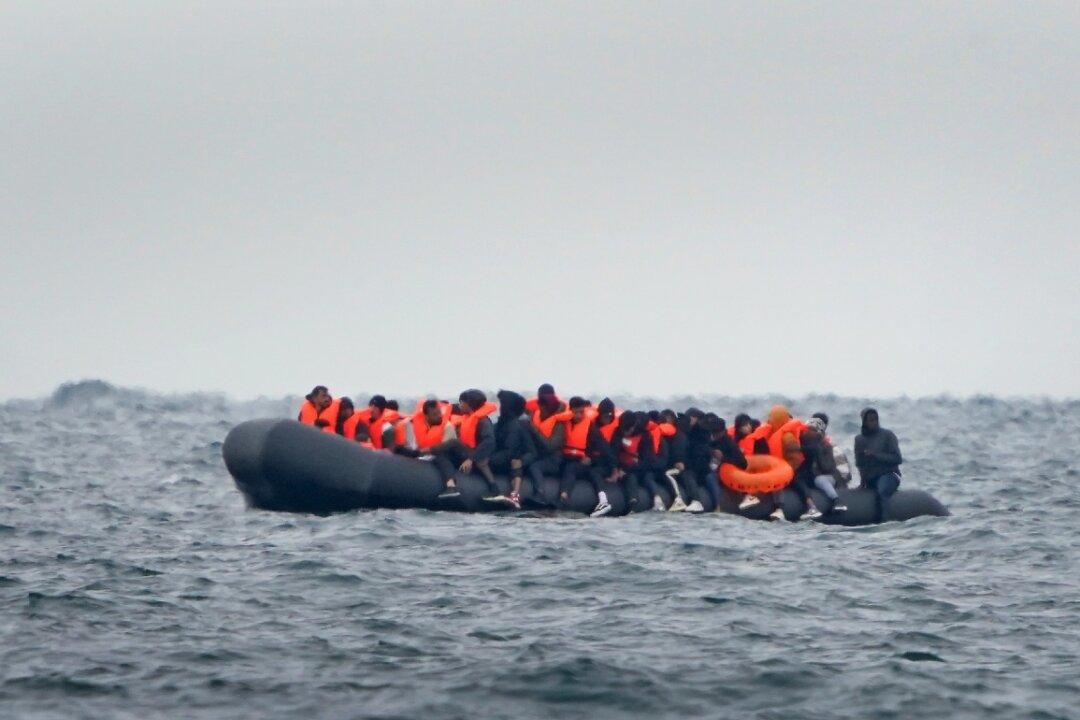The number of migrants crossing the English Channel has fallen year-on-year for the first time since current records began, with the total arrivals in 2023 down more than a third on 2022, Government figures show.
The last crossings of the year took place on Dec. 16, when 55 people made the journey from France in one boat.
The Home Office recorded no further crossings for the remaining 15 days of 2023 amid bad weather conditions. That is the longest consecutive period of the year without any arrivals.
For the first time in five years, since current records began in 2018, no Channel crossings took place on Christmas Eve, Christmas Day or Boxing Day.
The provisional annual total for the year, 29,437, is 36 percent lower than the record 45,774 crossings for the whole of 2022. But it is still the second-highest annual total on record, above the figure for 2021 (28,526).
Ministers will likely argue the figures show the UK’s £480 million agreement with France to beef up efforts to stop migrants from making the journey is starting to pay off, and may also suggest this points to the effectiveness of a fast-track returns deal struck with Albania.
But the Immigration Services Union, which represents border staff, said the drop in arrivals last year was likely to be a “glitch,” with “higher numbers” of Channel crossings expected in 2024.
Last month, Prime Minister Rishi Sunak said there was no “firm date” for meeting his pledge to “stop the boats” when facing questions from MPs.
The promise was one of the five priorities the prime minister set out at the start of 2023 when he said he would pass new laws to make sure people deemed to be arriving in the country illegally would be “detained and swiftly removed” as political pressure to grip the migrant crisis intensified.
The Government’s sweeping asylum reforms under the Illegal Migration Act became law in July but it is unclear when the rules will come into force.
Meanwhile, the Home Office is yet to confirm whether it has met Mr. Sunak’s target of clearing the backlog of so-called “legacy” asylum applications by the end of 2023.
Sacked home secretary Suella Braverman never got to see her “dream” of sending migrants to Rwanda succeed as the policy stalled amid legal action and was then ruled unlawful by the Supreme Court.
January will see fresh legislation back before Parliament in a bid to get flights off the ground after Home Secretary James Cleverly signed a treaty with the east African nation in a bid to firm up the agreement and satisfy concerns raised by the court.
But the prime minister faces threats of rebellion over the legislation from within his own party, with some MPs calling for tougher laws and others cautioning against harsher terms.
The number of migrants who have arrived in the UK after crossing the Channel since the Rwanda deal was signed in April 2022 by then Home Secretary Dame Priti Patel is approaching 70,000.
Almost 40,000 people have made the journey since Mr. Sunak became prime minister six months later.
He vowed to bring forward legislation in 2023 to make it “unambiguously clear that if you enter the UK illegally, you should not be able to remain here”.
The Illegal Migration Bill became an Act of Parliament after being given royal assent almost six months ago. At the time, officials were still working on when the Act would come into force and it was anticipated elements of the new laws would be implemented in stages over the coming months.
Among the series of measures announced last year to curb Channel crossings and tackle the backlog of asylum claims, Mr. Sunak vowed to stop housing asylum seekers in hotels, with the Government instead hunting for accommodation in empty holiday parks, former student halls and surplus military sites.
Meanwhile, the use of giant barge the Bibby Stockholm to house migrants off the coast of Portland in Dorset has been beset by problems, delays and disputes, with an inquest ongoing into the death of one asylum seeker thought to have taken his own life while living on board.
The number of migrants crossing the Channel has steadily increased since 299 people were detected in 2018. There were 1,843 crossings recorded in 2019 and 8,466 in 2020, according to the Home Office.
August 2022 was the highest month on record for crossings when 8,574 people arrived in the UK after making the journey. August 22 that year also saw a record 1,295 migrants crossing in a single day on 27 boats.
The number of arrivals per month began to fall toward the end of 2023, which could reflect seasonal changes in the amount of crossings being attempted as a result of the weather.
In December 1,077 people made the journey—compared to the 1,744 arrivals recorded in the last month of 2022.
Lucy Moreton, professional officer for the Immigration Services Union, told BBC Radio 4’s “Today” programme: “The planning assumption for 2024 is that 2023 has been unusually low.
“There have been other confounding factors—we have had particularly high winds, we have had a larger number of days where it is less likely that we are going to get migrants in boats.
“But we have also had much larger boats, much more seaworthy boats, so the planning assumption is that this is a glitch.
“Border Force needs to continue to resource itself—and the country needs to continue to resource itself — to deal with higher numbers.
“Will we see the peak that we saw in 2022? Maybe not, but certainly more than we have seen in the last year.”
Analysis of asylum decisions in 2023 by charity the Refugee Council suggested three in every four migrants (76 percent) who cross the Channel could be recognised as refugees if the Government had already processed their applications. The council also estimated around 15,000 asylum seekers were in limbo, as under the Government’s Illegal Migration Act they are at risk of being deported to Rwanda.
Refugee Council chief executive Enver Solomon said: “Instead of slamming our door in their face and extinguishing the right to asylum, we should be upholding the great British values of fairness and compassion, ensuring they are given a fair hearing on UK soil and welcoming those who need our protection.
“Closing down the asylum system will simply result in vast cost, chaos and human misery with tens of thousands of people stuck in permanent limbo.”




